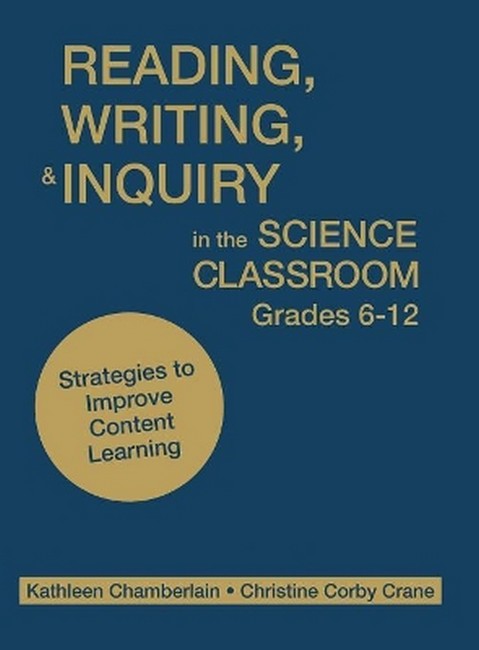Kathleen Chamberlain recently retired from Lycoming College in Williamsport, Pennsylvania, where she was an assistant professor of education and taught courses in curriculum and instruction, educational foundations, and literacy for secondary certification. While at Lycoming College, she also served as assistant dean for teaching effectiveness. She is a former teacher and administrator in K-12 schools. Chamberlain is the author of Middle Schools for a Diverse Society and journal articles about middle schools and science education and has conducted numerous workshops about teaching strategies, literacy, and student assessment. Currently, she is conducting research in a consortium of school districts that deals with addiction prevention programs for adolescents. A graduate of Indiana University of Pennsylvania, she earned her master's of science in education degree from Mansfield University of Pennsylvania. She has Pennsylvania administrative certifications from Bucknell University and she received her doctorate in curriculum and instruction from Pennsylvania State University, where she focused on middle-level education and school communities. Christine Corby Crane recently retired after a 26-year teaching career from the Athens Area School District in Athens, Pennsylvania, where she was the K-12 Science Department chair for nine years. She was instrumental in the district obtaining PA Environment and Ecology Exemplary Status for the 2007 school year after obtaining three grants to develop and implement a curriculum involving the Chesapeake Bay Watershed. In addition to teaching in Athens, she was an associate professor for Mansfield University, teaching science and technology methods courses. She has also taught K-12 science education courses for Penn State University. Crane has been a consultant for several federal, state, and community science education programs. She contributed to the Pennsylvania Department of Energy Elementary Energy and Environment Science Activities, Volume VI, and she is also the coauthor of a journal article, "Middle School Students Perceptions on How They Learn Science: Support for Inquiry-Based Classrooms." She conducts workshops and presentations on teaching science and teaches undergraduate courses and graduate science education courses as an adjunct professor at local colleges. She received her doctorate in curriculum and instruction from Pennsylvania State University, where she focused on science education and language and literacy. A graduate of Elmira College, she earned her master's of science degree from Mansfield University of Pennsylvania.
Request Academic Copy
Please copy the ISBN for submitting review copy form
Description
List of Figures Preface Acknowledgments About the Authors 1. Constructing a Scientifically Literate Society What Is Science? What Is Scientific Literacy? How Do We Reach Scientific Literacy? Classroom Strategies Questioning Inquiry Teaching Models 5E Lesson Design Generative Learning Model Assessing Inquiry Standards Summary 2. Textbooks in the Science Classroom Quality and Appropriateness of Textbooks Readability of Texts Students' Reading Abilities Matching Texts and Students Other Considerations for Textbook Evaluations Strategies for Using Textbook Materials Pre-Reading Activities Vocabulary Development Setting a Purpose for Reading During Reading Post-Reading Activities Summary 3. Beyond the Textbook Literature for Adolescents Genres of Trade Books Children's Books Comic Books and Graphic Novels Poetry Nursery Rhymes and Children's Songs Newspapers and Popular Magazines Book Talks Literature Circles Summary Books for Science Selected Trade Books Mentioned in This Chapter Web Sites Referenced 4. Writing in Science Why Writing? Types of Writing Informal Writing Tasks Formal Writing Tasks Formal Scientific Writing Formal Creative Writing Tasks Assessing Students' Work Creating the Environment Summary 5. Using Technology to Enhance Reading, Writing, and Inquiry Why Use Technology? Getting Started Hypermedia Geocaching Using the Internet Webquests Streaming Video The Globe Program Project Feeder Watch Course Management Systems Other Equipment Digital Cameras Handheld Computers Data Analysis Programs Databases Spreadsheets Technology and Writing Inspiration Claymation Visual Communicator Evaluating Software Programs Challenges Summary Sources for Computer Programs Referenced in This Chapter Web Sites Referenced in This Chapter Additional Web Sites of Interest References Index
"The strategies reflect what our preservice and veteran teachers need to teach in today's classrooms. From newspapers, magazines, and research reports to adolescent trade books, the authors offer numerous strategies for supplementing science classes with various reading materials." -- Amy M. Rogers, Instructor of Education "Thoroughly addresses lesson planning, vocabulary development, graphic organizers, and meeting the needs of students in special education. This book is especially beneficial for new teachers who want to include reading and writing activities in their daily lesson planning in a science classroom." -- Russell E. Eppinger, Principal

